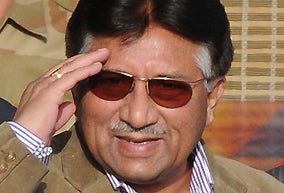Crooning Musharraf may dream of happier times

If Pervez Musharraf takes time to watch the video it may remind him of happier times.
Recorded two years ago but only made public now, the video that has become an internet hit shows the former military dictator performing a duet with one of Pakistan's most famous singers of traditional music. Such is the retired general's bravura performance, duetting with the legendary singer of ghazals, Ustad Hamid Ali Khan, that he has earned the praise of Pakistani music lovers, even if they did not approve of him as a leader.
Adil Najam, a Pakistani-academic now based in Boston and writes the blog Pakistaniat: All Things Pakistan, said the former president, forced to resign last summer, may hold a special position among the country's leaders. “Pervez Musharraf may or may not be the one leader who did the most good (or bad) for Pakistan. But he may well be the one who sings the best,” he wrote. “Of course, none of this changes my views on Gen Musharraf's politics. I am quite capable…of making those distinctions. But yes, he may well be the best signer among those who have ruled Pakistan. (I recall Zulfiqar Ali Bhutto singing along with singers too, but probably not this seriously, nor this well).”
The unlikely popularity of the video, which reveals Mr Musharraf matching Mr Ali Khan note for note in a delicate voice quite unlike the booming tone he often adopted for speeches, comes as the former leader - currently living in London's West End - faces a series of difficulties that must make him think nostalgically of when he could sit and sing, sitting next to his wife, Sehba.
This week police in Islamabad registered a criminal case against him accusing him of illegally detaining around 60 lawyers for five months when he imposed a state of emergency in November 2007. The action by the police means that Mr Musharraf could be arrested if he returns to Pakistan “He could either be arrested on his return or through Interpol,” said Hakam Khan, head of the police station where the case was lodged.
Meanwhile, the country's Supreme Court last month ruled that Mr Musharraf had violated the constitution when he sacked the judges - among them the chief justice and - imposed emergency rule in his desperate move to hold onto the presidency. The court also revisited a flurry of presidential decrees he had issued. The court left it up to parliament whether Mr Musharraf, once a vaunted ally of the United States, should be tried for treason.
Whether Mr Musharraf should be prosecuted is an issue which divides opinion in a country desperate for stability after years of political turmoil. The Pakistan People's Party (PPP) government, headed by Asif Ali Zardari, may be inclined not to push for the move, concerned that such action would anger a powerful military establishment disinclined to see one of its own brought before the courts. At the same time, the main opposition party, Nawaz Sharif's Pakistan Muslim League-N (PML-N), wants Mr Musharraf - who ousted the former prime minister in a 1999 coup - tried as quickly as possible.
Against this backdrop, Britain has apparently been urging restraint. Mark Lyall Grant, the political director of the Foreign Office and Britain's next ambassador to the UN, has been racing from one senior Pakistani politician to the other in a bid to stave off mounting pressure to bring the former leader to court
Mr Lyall Grant, who played a role in negotiating Mr Musharraf's resignation last year and helped stitch a deal between him and the late former prime minister Benazir Bhutto a year earlier, this week flew to Pakistan to urge Mr Sharif to relent in his demand that he be tried for “high treason”. Reports from the meeting at Mr Sharif's estate near Lahore suggest the British envoy's entreaties were rebuffed.
However, the British envoy last night issued a statement denying he was in Pakistan to “ to meddle in issues around former President Musharraf's future”. He added: “ That is a matter for the political leadership of Pakistan to decide.”
Either way, in such circumstances Mr Musharraf may feel inclined to stay in London quietly enjoying his cigars and games of bridge, rather than returning to Pakistan. One government official suggested the opposition was shadow-boxing by calling for a trial. The official said: “Why are they calling for a trial? Do they think Musharraf is ever going to come back to Pakistan?”
Subscribe to Independent Premium to bookmark this article
Want to bookmark your favourite articles and stories to read or reference later? Start your Independent Premium subscription today.

Join our commenting forum
Join thought-provoking conversations, follow other Independent readers and see their replies